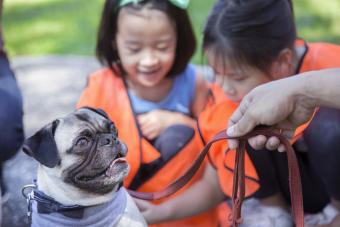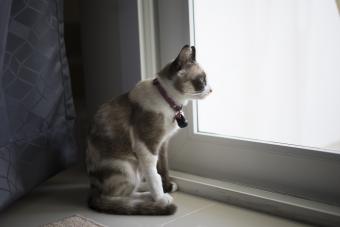
If you live in a hurricane-prone area, you probably have a family hurricane preparedness plan. Are your pets included in it? From pet-friendly evacuation sites to proper food storage, there are several things to keep in mind before, when, and after the storm hits. Keep your pets safe during hurricane season with these 10 things every owner should know about pets and hurricanes.
1. Make Sure All Pets Have ID
It’s really important for all pets to have at least one form of identification. Yes, that includes indoor-only cats! Make sure everyone is microchipped and confirm that the phone number and address connected to their chip are all current. Collars, harnesses, or leg ID bands are all essential too. This will help make sure you and your pet are reunited if you find yourself separated during the storm.
2. Pack a Pet Emergency Kit
Have an emergency pet supply kit with enough resources for at least three days, though it’s safest to have at least a week’s worth. That means food, medication, water, clean-up supplies, and anything else your pet might need to stay comfortable and safe.

3. Store Food Carefully
Moisture can breed mold and completely destroy your huge bag of dog food, leaving your pup with nothing to eat while you hunker down. Store all pet food in airtight containers to keep moisture out and your pet safe and well-fed.
4. Consider Alternate Power Sources
A power outage can be extremely harmful to your little critters if you have an aquarium or a terrarium with a heater. Have a generator ready to jump in as a backup source of power. That way, you can keep your tank’s filter and/or heater going, and your pet will never know anything happened.
5. Keep Everyone Calm
Storms can be absolutely terrifying for pets. Have plenty of techniques in your back pocket to keep your companions calm during the storm. Stay with your pet, distract them with a game, play some soothing music, or give them a calming chew to take the edge off. Talk to your vet about something stronger if they really panic.
6. Encourage Pottying Indoors
Yeah, it’ll be weird for everyone, but you might need to encourage your dog to potty inside if it’s too dangerous outdoors. Plus, a lot of dogs simply won’t go in the rain. Create a potty area with training pads and encourage your dog to do their business there.
If it is safe enough to bring your dog outside for a potty break, keep them on a leash in case they get spooked. Yes, even in your own yard.
7. Make a Pet Evacuation Plan
It’s not safe to leave your pets at home if you’re forced to evacuate. Have an evacuation plan in place so you know exactly how you’ll transport your furry, feathered, or scaled friends. Do you have enough carriers for everyone? Are you familiar with pet-friendly shelters or hotels on higher ground? Gather all this info beforehand, so there are no surprises.

8. Don’t Forget About Large Animals
Livestock and large pets, like horses, should only be kept inside if their structures are secure. If their barn looks like it could blow over or cave in at any moment, it’s definitely possible it might. These large animals are usually safer left out in the pasture, where they can find higher ground rather than being confined to an unsafe stable. Make sure they have plenty of food, water, and identification so you can round them up after the storm.
Secure all free-moving objects to keep anything from flying around and injuring your large animals.
9. Use Caution Outside After the Storm
Even though the storm has passed, it’s still not quite safe outside for your pet. Fallen trees, power lines, or contaminated water can serve as dangers as close as your own backyard. Only take your dog out on leash for at least the first few days post-storm and avoid letting cats or other pets roam free until everything is cleaned up.
10. Keep Them Up to Date on Preventives
Having your pet up to date on vaccines and preventives is important for a couple of reasons. If you have to evacuate and board them, you’ll need to have proof of their vaccinations. Plus, after the storm, they could be exposed to more harmful illnesses. Flooding can increase your dog’s exposure to the leptospirosis virus, heartworms, and other parasites.
Plan Ahead to Protect Your Pet During Hurricanes
Planning ahead is the best way to protect your pet during a hurricane. Stock up on their supplies so you have plenty for however long you’ll need to shelter in place or be away from home following an evacuation. Your pet is a huge part of the family. Make sure you include them in your family hurricane planning.







